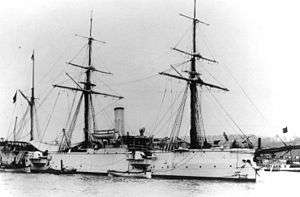Spanish cruiser Gravina
 An unidentified Velasco-class (here called "Infanta Isabel-class") cruiser in U.S. waters during the 1880s or 1890s, showing the appearance of Gravina | |
| History | |
|---|---|
| Name: | Gravina |
| Namesake: | Federico Carlos Gravina y Nápoli |
| Builder: | Thames Ironworks & Shipbuilding & Engineering Co. Ltd. |
| Launched: | 1881 |
| Fate: | Foundered 10 July 1884 |
| General characteristics | |
| Class and type: | Velasco-class unprotected cruiser |
| Displacement: | 1,152 tons |
| Length: | 210 ft 0 in (64.01 m) |
| Beam: | 32 ft 0 in (9.75 m) |
| Draft: | 13 ft 8 in (4.17 m) maximum |
| Installed power: | 1,500 ihp (1,100 kW) |
| Propulsion: | 1-shaft, horizontal compound, 4-cylinder boilers |
| Sail plan: | barque-rigged |
| Speed: | 13 knots (24 km/h; 15 mph) |
| Complement: | 173 officers and enlisted |
| Armament: |
|
| Notes: | 200 to 220 tons of coal (normal) |
Gravina was a Velasco-class unprotected cruiser of the Spanish Navy.
Technical characteristics
Gravina was built by the Thames Ironworks & Shipbuilding & Engineering Co. Ltd. at Leamouth, London in the United Kingdom. Her keel was laid in 1881. She had one rather tall funnel. She had an iron hull and was rigged as a barque. She and the lead ship of the class, Velasco, also built in the United Kingdom, were differently armed from and slightly faster than the final six ships of the class, all of which were built in Spain.
Operational history
Not long after her completion, Gravina was based in the Philippines. She had a short life, sinking in a typhoon on 10 July 1884 with the loss of two officers and seven crew.[1]
References
- ↑ "Cable Notes". Chicago Tribune. 16 July 1884. Retrieved 25 June 2016 – via Newspapers.com.
- Chesneau, Roger, and Eugene M. Kolesnik, Eds. Conway's All The World's Fighting Ships 1860–1905. New York, New York: Mayflower Books Inc., 1979. ISBN 0-8317-0302-4.
- Nofi, Albert A. The Spanish-American War, 1898. Conshohocken, Pennsylvania:Combined Books, Inc., 1996. ISBN 0-938289-57-8.
External links
- The Spanish-American War Centennial Website: Don Antonio de Ulloa
- Department of the Navy: Naval Historical Center: Online Library of Selected Images: Spanish Navy Ships: Conde del Venadito (Cruiser, 1888–1902)
This article is issued from Wikipedia - version of the 12/3/2016. The text is available under the Creative Commons Attribution/Share Alike but additional terms may apply for the media files.